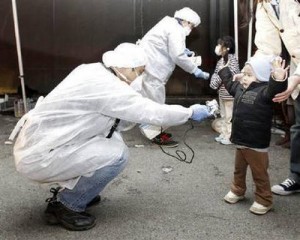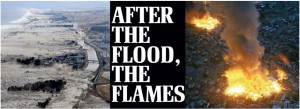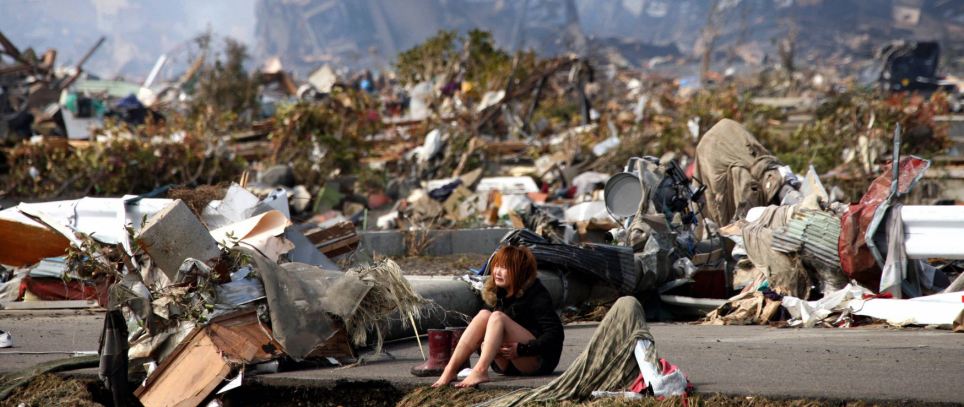[Author’s note: This commentary was originally published on Saturday, March 12 at 12:07 am. However, given the saturation media coverage of this disaster, I have decided to reprise it with an UPDATE appended.]
Earthquakes and other natural disasters should always remind us that there but for the grace of God… But there’s no denying that living in a relatively rich country increases one’s chance of surviving and recovering from such disasters tremendously…
It’s bad enough that accident of birth can consign one to a life of chronic poverty. It just seems unfair that even the wrath of Mother Nature affects the poor so disproportionately.
(Killer earthquakes: First Haiti, now Chile, The iPINIONS Journal, March 2, 2010)
Yesterday an earthquake registering a 9.0 magnitude hit Japan. It triggered a tsunami across the northern city of Sendai that sent all types of buildings, vehicles, and everything else in its path bobbing over vast land areas like corks in white-water rapids.
Latest reports are that 300 have been killed, but hundreds remain unaccounted for and are feared dead. Sizable aftershocks and tremors have disrupted life in Tokyo, Japan’s biggest city, forcing tens of thousands to sleep in train stations and in the streets after the public transport system came to a screeching halt.
Even worse, red alerts are being sounded about potential radiation leaks in several nuclear reactors at the Fukushima Daiichi power plant that could turn this natural disaster into a human catastrophe.
Offers to help with search and rescue efforts are rushing in from over 50 countries with a force commensurate with that of the tsunami. President Obama announced that, after consulting with Japanese Prime Minister Nauto Kan, he mobilized America’s considerable military assets in the region to provide whatever assistance is needed.
Today’s events remind us of just how fragile life can be. Our hearts go out to our friends in Japan and across the region and we’re going to stand with them as they recover and rebuild from this tragedy
(Obama, Los Angeles Times, March 11, 2011)
Of course the equality of all human life should compel us to regard all such tragedies with equal sympathy. But as my opening quote indicates, we invariably show less sympathy and render even less support when natural disasters befall relatively rich countries like Japan than we do when they befall poor ones like Haiti.
The primary reason for this, I submit, is twofold:
-
Natural disasters always come as an insult to the injury of chronic poverty and other privations that constitute daily life in poor countries; and rich countries always have more resources to recover and rebuild. (Japan is reportedly more prepared and equipped than any other country to deal with earthquakes. More to the point, talk has already begun about how a massive rebuilding effort might help Japan reclaim its place from China as the second-biggest economy in the world – after the United States.)
-
The tragedy of the hundreds (or even thousands) who may have died in Japan cannot compare with that of the hundreds of thousands who died in Haiti.
Nevertheless, I am mindful that the Japanese will grieve their loss just as intensely as the Haitians did.
Accordingly, I convey my deepest sympathy to all of the people of Japan, and my thoughts and prayers are with them as their country moves from rescue and recovery to rehabilitation and rebuilding in the days, months and years ahead.
NOTE: According to the U.S. Geological Survey, “Japan’s worst previous quake was a magnitude 8.3 in Kanto that killed 143,000 people in 1923. A 7.2-magnitude quake in Kobe killed 6,400 people in 1995.”
ENDNOTE: Am I the only one thinks this Japanese quake is just the cover Libyan dictator Muammar Gaddafi needs to finish squashing the floundering democratic uprising in his country; i.e., without the inhibiting glare of the international media…?
UPDATE
Latest reports are that the death toll “may top 10,000.” But, according to the Associated Press, the official count as of today is 2,800. In any case, given that the 2010 quake in Haiti and the 2004 tsunami in Indonesia each left over 200,000 dead, the death toll in Japan hardly seems newsworthy.
This, I submit, is why international media outlets are covering this story as if this quake has already triggered a full-scale nuclear meltdown that will make the fallout from Hiroshima and Nagasaki seem relatively minor. In fact, it triggered a few relatively harmless hydrogen explosions, which scientists have been fighting heroically to contain. This is a far cry from a full-scale nuclear meltdown.
But no less a person than the prime minister gave them cover to report on the potential for a nuclear catastrophe as a fait accompli after he declared this Japan’s worst crisis since World War II. (What a tragic irony it would be though if Japanese nuclear reactors end up killing more Japanese than American nuclear bombs did….)
TV stations cover natural disasters purportedly as a public service. But there’s no denying that such coverage is a ratings boon for their bottom line – catering as it does to the perverse thrill of suspense that keeps us fixated on the hype of impending doom….
(“Run for your lives…Katrina’s coming!” The iPINIONS Journal, August 29, 2005)
So now the story is not so much the natural disaster that has already occurred as it is the media prophesying about some man-made tragedy that may never come.
Not to mention how replete the Western media have been with indignant and know-it-all criticisms about the Japanese response. Indeed, so much so that you’d think nobody in Japan has any clue about how to deal with this unprecedented and wholly unforeseeable confluence of a quake, a tsunami and a potential nuclear meltdown. (Oh, right, there was a snow blizzard too.)
Mind you, these are the same reporters who were telling us in the immediate aftermath that the Japanese were better prepared to deal with a natural disaster than any other people on earth. More to the point, Japanese reporters and commentators could have spewed similar criticisms about the way the Americans responded to Hurricane Katrina and the BP oil spill….
 Meanwhile, of the 180,000 people who have been evacuated from the at-risk nuclear zone, reports are that less than 200 “may” have been exposed to non-lethal levels of radiation. (This does not include the 50-180 scientists who are on what some are calling a suicide mission to avert a catastrophe at that nuclear plant.)
Meanwhile, of the 180,000 people who have been evacuated from the at-risk nuclear zone, reports are that less than 200 “may” have been exposed to non-lethal levels of radiation. (This does not include the 50-180 scientists who are on what some are calling a suicide mission to avert a catastrophe at that nuclear plant.)
There’s no gainsaying the very serious nature of this crisis, and things could get much worse. But the media hysteria to date is clearly not warranted.
Of course, even if all of the doomsday reporting turns out to be unwarranted (as I fully expect will be the case), media outlets would have generated ratings the likes of which they have not seen since, well, Haiti.
Scaremongering sells! Hell, to listen to some American news reports, you’d think this disaster were unfolding in the northeastern United States instead of northeastern Japan. (Have you purchased your potassium iodide pills yet – to store with your apocalypse-now supplies … right next to the cipro you purchased in another fit of hysteria many years ago?)
Related commentaries:
Run for your lives…
To contribute to the relief effort please visit: redcross.org

